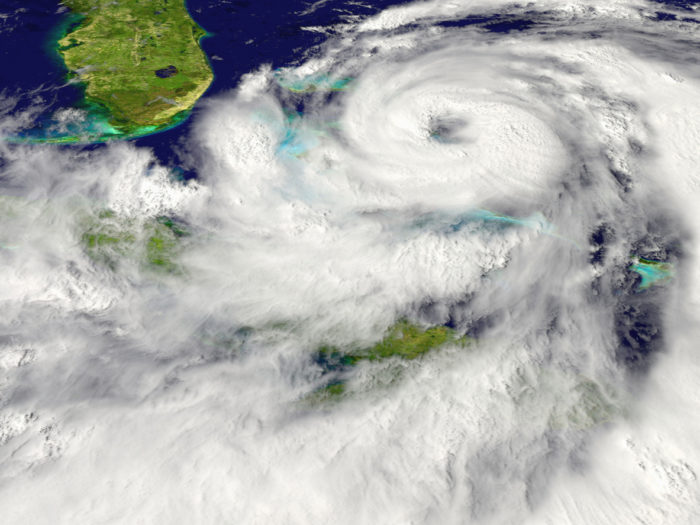We in the southeast coastal areas just can’t wait for it!
Hurricane season starts June 1, and the time to put a plan into place is now. The season is a long one – it runs through Nov. 30 – so any plan is subject to change, but the important thing is to have one and use it.
The first thing a plan should include is a reliable place to stay outside of the storm’s path. Ideally, it should include three places – the more options, the better. If an out-of-town family member or friend can offer respite during a storm, take advantage. Checking into a hotel is something to consider, as is getting on a plane and flying somewhere with better weather. If none of the above is possible, find out where the nearest hurricane shelter is. It could be a church, a community center or a school. If an evacuation order is given, follow it.
If an evacuation order is not given, and it is safe to shelter in place, make sure the house has the proper provisions.
A three-day supply of water – one gallon per person per day
A three-day supply of nonperishable food
A seven-day supply of medication
A first-aid kit
Flashlights, radios and extra batteries
Cell-phone chargers
Cash
Basic tools
Paper products
Trash bags
“Hurricanes are strong storms that cause life- and property-threatening hazards such as flooding, storm surge, high winds and tornadoes,” according to the American Red Cross. “Preparation is the best protection against the dangers of a hurricane.”
Families with babies and / or pets need additional supplies such as bottles, formula, diapers and clothing, and a collar with ID, a leash, a carrier and a week’s supply of food.
“Securely fasten a current identification tag to your pet’s collar and carry a photograph of your pet,” the National Hurricane Survival Initiative suggests. “It’s important to include the phone number of a friend or family member on the tag so anyone who may find your pet is able to reach someone who knows you.”
Personal documents should be gathered and stored in a waterproof container.
Insurance policies
Deeds
Bank-account numbers
Credit-card numbers
Social Security cards
Passports
Wills
Birth, death and marriage certificates
“Store your kit in a convenient place known to all family members,” the National Hurricane Survival Initiative suggests.
Review a hurricane plan every month during the season and amend or update it as needed. It is a good idea , to stay informed about the weather conditions and know when watches and warnings are issued. A hurricane watch indicates hurricane conditions – winds of 73 miles per hour or higher – will arrive within 48 hours. A hurricane warning indicates those conditions will arrive within 36 hours. Tropical-storm watches and warnings are the same but pertain to winds of 39 to 73 miles per hour.
Steps to take when a hurricane watch is issued are 1) review the plan and decide where to go and 2) check all supplies and make sure they are stocked. Steps to take when a hurricane warning is issued are 1) put up storm shutters, 2) finalize storm preparedness and 3) follow evacuation orders if they are given.
Days before any watches and warnings are issued is when the house should be ready for a direct hit. Outdoor furniture, grills, potted plants, décor – anything that could fly away and cause damage – need to come inside. Gutters, downspouts and roofs should be secured. Trees should be trimmed and clippings disposed of. Identify a safe room in which to retreat in case of an emergency.
“The best way to reduce the risk of damage to a structure from hurricane winds is to reinforce or strengthen the building including doors, windows, walls, and roofs,” the Federal Emergency Management Agency states in its “How To Prepare for a Hurricane” guide. “The best way to protect yourself is to consider either constructing a safe room that meets FEMA criteria or a storm shelter that meets ICC 500 criteria.”
Most injuries and deaths caused by hurricanes occur after the storm has passed. Fallen debris makes walking dangerous. Downed powerlines increase the risk of electrocution. Structures might be unstable and could collapse. Driving is not recommended because of road hazards. In an evacuation, it is unsafe to return home until local officials give the all-clear.
Avoid floodwaters, which can hide broken glass, sharp metal, snakes and sewage.
Do not use candles to illuminate a home.
Do not drink tap water or use it for cooking until authorities say it is OK to do so.
Wear boots, gloves and goggles for protection.
“Planning and preparing can make a big difference in safety and resiliency in the wake of a hurricane,” the FEMA guide states. “The ability to quickly recover following a hurricane requires a focus on preparedness, advance planning, and knowing what to do in the event of a hurricane.”
Share This



